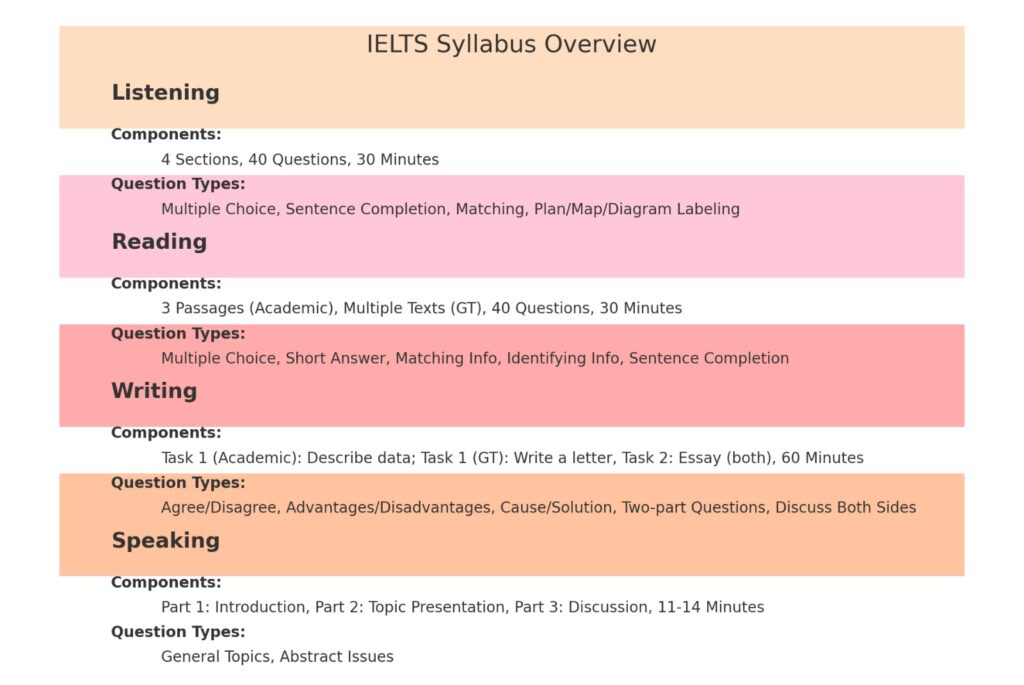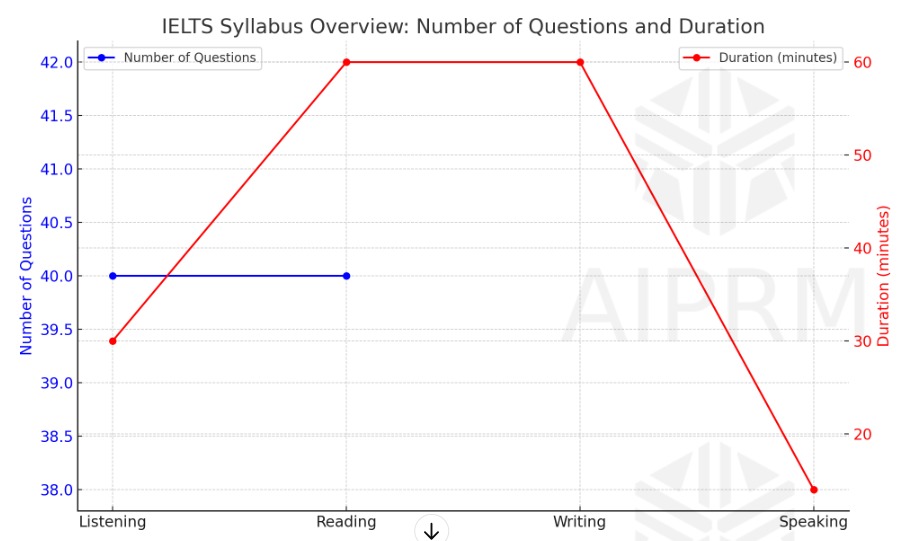
| Section | Description | Questions (Approx.) | Time | Question Types |
| Listening | 4 sections | 40 | 30 minutes | Multiple Choice, Sentence Completion, Matching, Plan/Map/Diagram Labeling |
| Reading | Academic: 3 passages | 40 | 30 minutes | Multiple Choice, Short Answer, Matching Info, Identifying Info, Sentence Completion |
| Reading | General Training: Multiple texts | 40 | 30 minutes | Multiple Choice, Short Answer, Matching Info, Identifying Info, Sentence Completion |
| Writing | Task 1 (Academic): Describe data | – | 60 minutes | – |
| Writing | Task 1 (General Training): Write a letter | – | 60 minutes | – |
| Writing | Task 2: Essay (both) | – | 60 minutes | Agree/Disagree, Advantages/Disadvantages, Cause/Solution, Two-part Questions, Discuss Both Sides |
| Speaking | Part 1: Introduction | – | 11-14 minutes | General Topics |
| Speaking | Part 2: Topic Presentation | – | 11-14 minutes | General Topics, Abstract Issues |
| Speaking | Part 3: Discussion | – | 11-14 minutes | Abstract Issues |
If you’re aiming for a high band score on the IELTS, it’s essential to be thoroughly familiar with the exam syllabus. The IELTS, or International English Language Testing System, comes in two formats: IELTS Academic and IELTS General Training. Your choice depends on your specific needs or the requirements of the university or course you’re applying to.
Table of Contents
ToggleThe IELTS exam comprises four key sections: Reading, Speaking, Writing, and Listening. While the Speaking and Listening sections are the same for both IELTS Academic and IELTS General Training, the Reading and Writing sections differ between the two formats.
IELTS Academic: Includes texts from books, journals, magazines, and newspapers, designed for those pursuing higher education.
IELTS General Training: Features extracts from books, magazines, newspapers, notices, advertisements, company handbooks, and guidelines, focusing on daily life and work settings.
Conducted face-to-face with an examiner, this section assesses your spoken English through a structured interview that includes short questions, speaking at length about a familiar topic, and a two-way discussion.
IELTS Academic: Involves tasks such as describing visual information (e.g., graphs or diagrams) and writing essays on given topics.
IELTS General Training: Includes writing letters (formal or informal) and essays on topics of general interest.
Consists of four recordings of native English speakers and includes a mix of monologues and conversations.
The entire IELTS test lasts 2 hours and 45 minutes, covering all four sections. Both versions of the IELTS provide a comprehensive and accurate assessment of your listening, reading, writing, and speaking skills.
Understanding the syllabus is a crucial step toward achieving your desired band score. With this knowledge, you can tailor your preparation to focus on the specific skills and types of questions you will encounter in the exam. Enrolling in IELTS training from experts can provide valuable guidance, helping you navigate through the syllabus more effectively. Expert training also ensures that you are equipped with strategies to tackle each section of the exam confidently
IELTS Listening Section
IELTS Reading Section
IELTS Writing Section
IELTS Speaking Section
You’ll listen to four different recordings and then answer questions based on what you’ve heard. The recordings cover various topics and situations, so it’s important to pay close attention.
In this part, you’ll read three lengthy texts and answer a total of 40 questions. The texts will be taken from books, magazines, newspapers, and journals, so they cover a range of topics.
You’ll complete two writing tasks. Writing Task 1 typically involves describing visual information, such as graphs or charts. Writing Task 2 requires you to write an essay on a topic of general interest
This section is divided into three parts. First, you’ll answer general questions about yourself. Next, you’ll speak on a particular topic provided on a cue card. Finally, you’ll answer more in-depth questions related to the topic you discussed in Part 2
30 minutes
60 minutes
11 – 14 minutes
161 – 164 minutes

IELTS, formally known as the International English Language Testing System, is more than just an exam—it’s a gateway to international education and career prospects. Designed for non-native English speakers aiming to study or work in English-speaking environments, IELTS is a pivotal assessment developed and managed by the British Council in collaboration with IDP Education and Cambridge Assessment English. Its widespread recognition in countries like the UK, USA, Canada, and Australia underscores its importance in global academic and professional arenas.
If your ambitions include securing admission to top international universities or pursuing career opportunities abroad, achieving a strong IELTS score is essential.
Additionally, this blog offers the latest updates on IELTS, ensuring you’re well-prepared for the exam’s evolving requirements. But before diving into these updates, let’s explore why choosing IELTS can steer your career in the right direction.
Numerous countries worldwide recognize the value of good IELTS band scores for admitting students. However, if you’re considering studying abroad, five popular destinations—Australia, New Zealand, Canada, the UK, and the USA—likely rank high on your list. Before delving into the latest IELTS rules and updates, it’s crucial to familiarize yourself with the specific band score requirements of these top five countries.
Australia
New Zealand
Canada
U.K.
U.S.A
6.0 | 6.5
6.0 to 6.5 | 6.0 to 6.5
5.5 to 6.0 | 6.0 to 6.5
6.5 | 7.0 to 7.5
6.0 | 7.0
Preparing for the IELTS in 2024? Stay informed about the latest exam updates, including changes in the IELTS pattern. Understanding these updates is crucial before attempting the exam. Explore detailed insights with the experts at Gradding.com, where experienced professionals can guide you through these international test nuances. Below, find concise details outlining the latest changes in the IELTS format for 2023-24.
LISTENING 30 Minutes ( 04 Sections)
READING 60 Minutes ( 03 Sections)
WRITING 60 Minutes ( 02 Sections )
SPEAKING 11-14 Minutes (Face to Face Interview)
Now, these changes have been made:
WRITING 60 Minutes ( 02 Sections )
LISTENING 30 Minutes ( 04 Sections)
READING 60 Minutes ( 03 Sections)
SPEAKING 11-14 Minutes (Face to Face Interview)
Great news awaits those preparing for the next IELTS intake! As you’ve seen in the recent updates, the IELTS exam has introduced a new feature that can significantly enhance your preparation experience: the ability to retake a specific skill. For international students aiming to study abroad, this update comes as a relief, eliminating the need to reschedule the entire exam if you fall short in one area.
Now, whether it’s writing, reading, speaking, or listening, you have the opportunity to focus on improving a particular skill without the pressure of retaking the entire test. This flexibility is currently available for the Computer-Based Testing (CBT) version of IELTS across all centers in India.
What makes this update even more beneficial is its recognition by esteemed institutions such as the Australian Home Affairs and the Australian Health Practitioners Regulation Agency, along with top universities worldwide. This ensures that your efforts to enhance specific language skills are recognized and valued by institutions critical to your academic and professional aspirations.

The IELTS Writing section is designed to assess your ability to write clear and coherent texts. In this section, you’ll complete two tasks, each with a specific focus and audience.
Task 1:
Length: At least 150 words
Task 2:
You’ll need to manage your time effectively to ensure you complete both tasks within the hour. A good strategy is to spend about 20 minutes on Task 1 and 40 minutes on Task 2, as Task 2 carries more weight in your overall writing score.
By practicing these tasks and familiarizing yourself with the types of questions you’ll encounter, you’ll be better prepared to tackle the IELTS Writing section with confidence.
The IELTS General Training Writing section includes two tasks, and many find it more approachable than the Academic format.
In the first task, you’ll need to write a letter based on a given situation. The letter could be:
Depending on the scenario, you might be asked to explain something, make a request, or express your viewpoint to someone in authority.
In the second task, you’ll write an essay on a given topic. You’ll need to present your arguments and opinions, supporting them with relevant examples. Unlike the Academic format, you can adopt a more personal writing style here.
The General Training Writing section allows you to showcase your ability to communicate effectively in everyday situations, making it a practical and valuable skill for real-life contexts.
The IELTS Reading section is designed to test your ability to understand and interpret written English. It consists of three passages of general interest, suitable for candidates entering undergraduate or postgraduate courses. There are around 40 questions in total, covering a range of question types, including multiple-choice, sentence or summary completion, short-answer questions, matching lists or phrases, and identifying writers’ views or attitudes.
Total Number of Questions: Approximately 40
Total Time: 60 minutes
In the academic version, you’ll encounter three long texts that can be descriptive, factual, or analytical. These texts are usually excerpts from newspapers, research papers, journals, books, or magazines, and are aimed at a non-specialist audience. This format is perfect for those aiming for higher education or professional work abroad.
The general training version also has three sections, but the texts are more everyday in nature. You might find passages from advertisements, company guidelines, brochures, and similar sources. This format is generally easier than the academic version since the texts are more familiar and practical.
The IELTS Listening section assesses your ability to understand spoken English in various contexts. It is divided into four sections, each featuring different types of conversations and monologues.
Each recording lasts about three minutes and is played only once. You’ll answer a variety of question types, such as multiple-choice, short-answer questions, note completion, sentence completion, and labeling a diagram.
Total Number of Questions: 40+
Total Time: 30 minutes
The IELTS Listening test is designed to assess your ability to understand spoken English in various contexts. Here’s a breakdown of what to expect:
Understanding these sections and practicing with similar recordings will help you become more familiar with the test format and improve your listening skills.

The IELTS Speaking section is a structured interview designed to evaluate your general speaking skills and ability to communicate effectively in English. Here’s a breakdown of what to expect:
In the first part, you’ll be asked simple questions about yourself, such as your family, home, studies, hobbies, and interests. This section helps the examiner get to know you and warms you up for the rest of the test.
Next, you’ll receive a flashcard with a specific topic. You’ll have a minute or two to prepare your thoughts before speaking about the topic for around two minutes. After your speech, the examiner might ask a few follow-up questions to gauge your understanding.
In the final part, you’ll engage in a deeper discussion based on the topic from Part 2. This section involves more abstract questions and gives you a chance to explore the topic in more detail. It typically lasts five to six minutes.
Listening
Reading
Writing
Speaking
You’ll listen to four recorded monologues and conversations, testing your ability to understand spoken English in different contexts
This section includes three long passages with tasks that range from descriptive and factual to discursive and analytical. You’ll encounter texts from sources like books, journals, and newspapers, along with non-verbal materials such as diagrams, graphs, and illustrations.
The face-to-face interview assesses your spoken English through:
Question 4
Duration: 30 minutes
Questions: 40
Duration: 60 minutes
Questions: 2
Duration: 60 minutes
Questions: 3
Duration: 11 to 14 minutes
The IELTS exam comes in two main types, each serving different purposes:
IELTS Academic is tailored for individuals aspiring to pursue higher education or professional registration in English-speaking countries like the US, UK, Canada, Australia, and New Zealand. It assesses whether candidates are proficient enough to commence studying or training in English.
IELTS General Training is designed for those planning to migrate to countries such as New Zealand, Australia, Canada, the US, and the UK, or seeking secondary education, vocational training, or work experience in an English-speaking environment. This version of the exam evaluates candidates’ ability to handle everyday interactions in social and workplace settings.
Preparing for the IELTS exam can be approached in two ways: self-study or attending IELTS coaching in Kerala. The choice between these methods depends on your current level of language proficiency and personal comfort.
| Section | Description | Questions (Approx.) | Time | Question Types |
| Listening | 4 sections | 40 | 30 minutes | Multiple Choice, Sentence Completion, Matching, Plan/Map/Diagram Labeling |
| Reading | Academic: 3 passages | 40 | 30 minutes | Multiple Choice, Short Answer, Matching Info, Identifying Info, Sentence Completion |
| Reading | General Training: Multiple texts | 40 | 30 minutes | Multiple Choice, Short Answer, Matching Info, Identifying Info, Sentence Completion |
| Writing | Task 1 (Academic): Describe data | – | 60 minutes | – |
| Writing | Task 1 (General Training): Write a letter | – | 60 minutes | – |
| Writing | Task 2: Essay (both) | – | 60 minutes | Agree/Disagree, Advantages/Disadvantages, Cause/Solution, Two-part Questions, Discuss Both Sides |
| Speaking | Part 1: Introduction | – | 11-14 minutes | General Topics |
| Speaking | Part 2: Topic Presentation | – | 11-14 minutes | General Topics, Abstract Issues |
| Speaking | Part 3: Discussion | – | 11-14 minutes | Abstract Issues |
As we step into 2024, the IELTS landscape is evolving with new opportunities and strategies to help you excel in the exam.
Rising Demand and Potential for Online Testing: The demand for IELTS is reaching new heights in 2024, reflecting its increasing importance for global opportunities. Discussions are also underway about introducing a computer-delivered IELTS test this year, offering more flexibility for test-takers. Stay tuned for official announcements!
AI Scoring on the Horizon: While human examiners remain integral to the IELTS experience, ongoing research is exploring AI-assisted scoring. This innovation aims to streamline the scoring process in the future, ensuring fairness and efficiency.
Strategies for IELTS Success:
Preparing with these strategies will equip you to navigate the complexities of the IELTS exam in 2024, setting you on a path to success in achieving your academic and career goals.
Can You Really Ace the IELTS in One Hour?
The IELTS, or International English Language Testing System, is a standardized test required for many immigration and educational opportunities. It assesses your English proficiency across four key areas: Listening, Reading, Writing, and Speaking. Scoring well can be crucial, so naturally, many people seek comprehensive preparation courses.
But a new Youtube video by tactiq.io throws a curveball. Titled “IELTS 2023 Complete Course in 1 HOUR! (You won’t need another video!),” the video claims to offer a condensed course to crack the IELTS in just 60 minutes.
So, is this too good to be true?
Likely, yes. While the video provides a basic overview of the test format, including the four sections, their durations, and the difference between Academic and General Training versions, a full hour is unlikely to be sufficient preparation for a complex exam like the IELTS.
The video delves deeper into the Listening section, explaining the four recording types (everyday conversation, monologue on a social context, monologue on an academic topic, and a combination) and the types of questions you might encounter (multiple choice, sentence completion, etc.). They even offer some valuable tips like attentively reading questions beforehand, taking notes during the recording, and utilizing review time effectively. However, truly mastering this section requires extensive practice with real test-like materials.
The video showcases an example of the first recording type (everyday conversation) along with how to answer questions based on it. This is a helpful starting point, but the IELTS requires familiarity with all recording types and the ability to handle a wider range of topics and accents.
What Can This Article Offer You?
Official IELTS resources: Familiarize yourself with the official IELTS website for detailed information about the test format, registration process, and sample test materials.
Practice tests: Take full-length practice tests under timed conditions to simulate the actual exam experience and identify your strengths and weaknesses.
Targeted study materials: Explore resources dedicated to each section of the IELTS, including vocabulary building, grammar practice, and writing task frameworks.
Speaking practice: Find a language partner or tutor to hone your conversation skills and get comfortable speaking on various topics.
Still have questions about IELTS? Explore our frequently asked questions section to find answers about the exam format, preparation strategies, and the IELTS syllabus. Understanding these details can enhance your readiness and confidence on exam day.
As the world’s leading immigration and visa solutions agency, we’re experts in securing all types of visas globally. With offices in Trivandrum, Calicut, Coimbatore, the UK, and the UAE, we’re here to make your dreams of studying or working abroad a reality.
At Universal Studies and Immigration, we understand that the journey can be both thrilling and daunting. Established in 2006, we are well-versed in the complex visa application process. Our passion is helping clients like you find the next step in your international adventure.
Contact our overseas education consultants in Kerala and let us take care of the details, so you can focus on your exciting new journey!

Passing the IELTS exam is manageable if you have a good grasp of English. With preparation, you can also improve your band score. There’s no pass or fail; instead, candidates set target scores to meet admission requirements for their desired institutions. Familiarizing yourself with the IELTS Syllabus 2023 (section-wise) is crucial for effective test preparation.
The Academic Writing module consists of two tasks. Task 1 requires describing visual information in your own words, while Task 2 involves discussing an argument, problem, or point of view provided.
The Reading module comprises three sections with a total of 40 questions. It features topics of general interest sourced from books, magazines, online resources, or newspapers. Accuracy in grammar and spelling is essential as marks are deducted for errors.
The Speaking test is a face-to-face interview between the test taker and an examiner, divided into three parts. Candidates are evaluated on grammar, pronunciation, lexical resource, and fluency. The Speaking test is recorded for assessment.
The Listening test is divided into four parts, each with 10 questions. Parts 1 and 2 focus on everyday social situations, while Parts 3 and 4 cover educational contexts. Questions follow the sequence of information in the recording, so the answer to each question corresponds to its place in the recording.
You must have a valid passport on the test date. If your passport expires before the test, you’ll need to reschedule and present a valid passport at the test center.
The Speaking test date is system-generated and cannot be rescheduled.
If you register but do not appear for the test, you will be marked as absent, and no refund will be issued.
IELTS assesses how well you use the English language, covering reading, writing, listening, and speaking skills. Thorough preparation is essential for success in the test.

We are officially recognised specialists in issuing all types of visas around the world.
© 2024 Universal Migration. All rights reserved. Privacy Policy | Terms of Service.